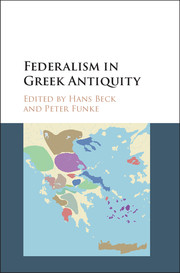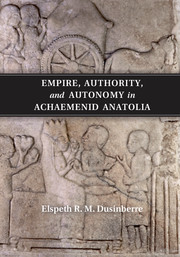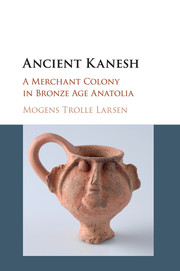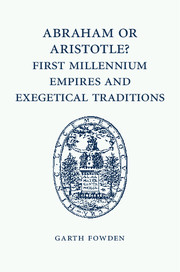Refine search
Actions for selected content:
23990 results in Ancient history
Chapter 4 - Akarnania and the Akarnanian League
-
-
- Book:
- Federalism in Greek Antiquity
- Published online:
- 05 November 2015
- Print publication:
- 05 November 2015, pp 66-85
-
- Chapter
- Export citation
Bibliography
-
- Book:
- Federalism in Greek Antiquity
- Published online:
- 05 November 2015
- Print publication:
- 05 November 2015, pp 524-589
-
- Chapter
- Export citation
Chapter 7 - Boiotia and the Boiotian Leagues
-
-
- Book:
- Federalism in Greek Antiquity
- Published online:
- 05 November 2015
- Print publication:
- 05 November 2015, pp 132-157
-
- Chapter
- Export citation
Maps
-
- Book:
- Federalism in Greek Antiquity
- Published online:
- 05 November 2015
- Print publication:
- 05 November 2015, pp xxi-xxviii
-
- Chapter
- Export citation
Maps
-
- Book:
- Federalism in Greek Antiquity
- Published online:
- 05 November 2015
- Print publication:
- 05 November 2015, pp viii-viii
-
- Chapter
- Export citation
Contributors
-
- Book:
- Federalism in Greek Antiquity
- Published online:
- 05 November 2015
- Print publication:
- 05 November 2015, pp ix-xii
-
- Chapter
- Export citation
Epilogue - The persistence of festivals and the end of sacrifices
- from Part III - Christianity and private ritual
-
- Book:
- Roman Festivals in the Greek East
- Published online:
- 05 November 2015
- Print publication:
- 05 November 2015, pp 305-322
-
- Chapter
- Export citation
Chapter 8 - The Euboian League – an ‘irregular’koinon?
-
-
- Book:
- Federalism in Greek Antiquity
- Published online:
- 05 November 2015
- Print publication:
- 05 November 2015, pp 158-178
-
- Chapter
- Export citation
A note on the transliteration of ancient Greek
-
- Book:
- Federalism in Greek Antiquity
- Published online:
- 05 November 2015
- Print publication:
- 05 November 2015, pp xvi-xvi
-
- Chapter
- Export citation
Chapter 9 - The Lokrians and their federal leagues
-
-
- Book:
- Federalism in Greek Antiquity
- Published online:
- 05 November 2015
- Print publication:
- 05 November 2015, pp 179-198
-
- Chapter
- Export citation
Chapter 6 - The Achaian League
-
-
- Book:
- Federalism in Greek Antiquity
- Published online:
- 05 November 2015
- Print publication:
- 05 November 2015, pp 118-131
-
- Chapter
- Export citation

Federalism in Greek Antiquity
-
- Published online:
- 05 November 2015
- Print publication:
- 05 November 2015

Empire, Authority, and Autonomy in Achaemenid Anatolia
-
- Published online:
- 05 October 2015
- Print publication:
- 29 April 2013

Ancient Kanesh
- A Merchant Colony in Bronze Age Anatolia
-
- Published online:
- 05 October 2015
- Print publication:
- 17 September 2015

Abraham or Aristotle? First Millennium Empires and Exegetical Traditions
- An Inaugural Lecture by the Sultan Qaboos Professor of Abrahamic Faiths Given in the University of Cambridge, 4 December 2013
-
- Published online:
- 05 October 2015
- Print publication:
- 09 April 2015
Part IV - Economy and Society
-
- Book:
- Ancient Kanesh
- Published online:
- 05 October 2015
- Print publication:
- 17 September 2015, pp 169-240
-
- Chapter
- Export citation
Appendix - Families and Names
-
- Book:
- Ancient Kanesh
- Published online:
- 05 October 2015
- Print publication:
- 17 September 2015, pp 281-290
-
- Chapter
- Export citation
17 - Where Did the Money Come from?
- from Part IV - Economy and Society
-
- Book:
- Ancient Kanesh
- Published online:
- 05 October 2015
- Print publication:
- 17 September 2015, pp 217-227
-
- Chapter
- Export citation
Index of Old Assyrian Texts
-
- Book:
- Ancient Kanesh
- Published online:
- 05 October 2015
- Print publication:
- 17 September 2015, pp 321-322
-
- Chapter
- Export citation
Chronology
-
- Book:
- Ancient Kanesh
- Published online:
- 05 October 2015
- Print publication:
- 17 September 2015, pp xi-xii
-
- Chapter
- Export citation
